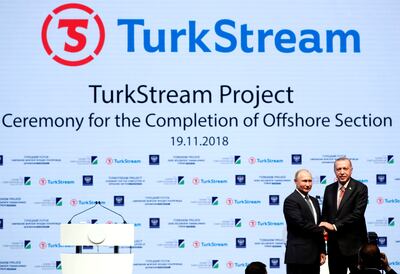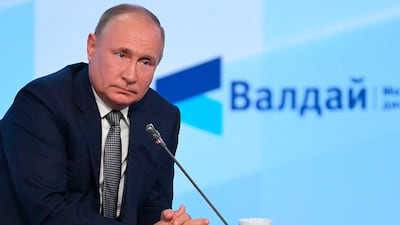Earlier in the week, I attended the Valdai Club’s 18th annual conference in Sochi for discussions on Russia’s strategic priorities. This year’s theme was “Global shake-up in the 21st century: the individual, values, and the state”.
Remarkably, the Middle East was absent as a topic of discussion this time. Attendees from the region were also small in number. This was an indication that Russians are lately less focused on our region than they are on their own country’s place in the world, its strategic options, its alliances and how to remain a superpower.
One of Russia’s challenges today is finding its rightful place in the league of superpowers. It has been sandwiched between the giants of yesterday and today, including the US, China and Europe. But where does Russia stand vis-a-vis the rest? Is it, like is sometimes suggested, a junior partner of China? After all, Russians don’t view their country as anything less than an empire. Moscow has long been suspicious of the West, particularly Europe, but how must it deal with the US? Moreover, Russia’s is not a top-five economy. In which case, is the essence of Russia more about its identity and its status as a geopolitical actor?
These are tricky questions and I came away with the impression that the country is facing complicated choices with regard to its alliances and relationships in a world in flux.
A potential Russia-China alliance, for instance, seems beneficial to Moscow in the short term. But it is fraught with risk over the long term for geographic, demographic and economic reasons. There are concerns in Russia that their country could, eventually, be effectively overshadowed by China.
Russia-Europe ties, meanwhile, are rooted in history and culture. But the likelihood of an alliance is minimal, given how different their respective political values are. The Europeans keep hankering over human rights as an issue, while Moscow sees any finger-pointing from Brussels as a pretext to meddle in its internal affairs. Also, Russia does not see a reason to adopt democratic values as defined by the West.
Russia’s relationship with Europe is also complicated by the latter’s association with the US. Which brings us to the possibility of a Russia-America alliance. One source of tension between the two countries, as one expert put it to me in Sochi, is that the US has been loath to view Russia as an equal partner.
So how does Russia engage with its three fellow superpowers? According to some Russian experts, it’s possible for Moscow to strike an “equilibrium” with China and Europe.

There is strong co-operation between Russia and China in Central Asia, where the former provides security through military presence, and the latter offers developmental funds. The region is currently a source of great anxiety for Moscow, especially after the US’s withdrawal from Afghanistan. From Tajikistan to Turkmenistan and elsewhere in the Caucasus, Russia’s priority is stability – which, in the Russian sense, means political and ideological stability. Moscow worries about an uncontrollable influx of migrants, some of whom may be inspired by extremist groups such as Al Qaeda and ISIS.
Withdrawal of US-led forces from Afghanistan has undermined Russian strategy. Whether or not this was part of Washington’s ploy to lure Russia and China into Afghanistan – as some have claimed – there is little doubt that Russia once again finds itself at the heart of the Afghan question. It is, therefore, focused on containing the crisis and the possible subsequent threat of a terror contagion via Central Asia.
As for Europe, the Kremlin does not enjoy a friendly equation with the EU as a whole. Moscow has even been increasingly unhappy with some member states, notably Germany and France, for different, mostly economic reasons, ranging from sanctions to the gas supplies. Some of the sources of their friction emanate from outside the continent. Russia and France, for instance, have a clash of interests in parts of Africa and inside Lebanon. And yet, Moscow has cultivated favourable relations with other countries within the 27-member bloc.
Russia, meanwhile, also maintains pragmatic relations with countries outside the league of superpowers, such as Turkey and Iran, two players with outsized roles in the Middle East and Central Asia.

As was made apparent to me in Sochi this week, Russian-Turkish trade relations are deep and perhaps paralleled only by Moscow's trade relations with Israel. Both Russia and Turkey have some commonalities, too: for instance, they still hark back to a time when they were large and powerful empires.
Ties with Iran are different in substance. Deep economic or historical linkages don’t exist just yet, neither do cultural or ideological threads. As one expert put it to me, Iran is simply a “political partner” to Russia in war-torn Syria, where both governments are allied to the Assad regime.
What these ties suggest, in a nutshell, is that Russia remains open to creating a network of regional alliances that are entirely pragmatic in nature. An example of this is the so-called Astana Process, which brings together Russia, Turkey and Iran, all of which have different interests in Syria.
Curiously, according to Mr Putin himself, only the values that underpin Russia can pave the way for his country to emerge from any crisis – whether it is dealing with external shocks or adapting to change. Few solutions, he has insisted, are achieved through uprisings or revolutions. Indeed, the president has presented himself as a leader who espouses healthy conservatism, abhors extremism and knows how to position his country in the world. He also tends to push back against the notion that global problems require global solutions, as that would mean making certain compromises on national sovereignty.
Yet, it is evident that a healthy dose of pragmatism has been just as important a feature of how the Russian government has dealt with the myriad challenges the country faced over the years – and also how it continues to build relationships around the world.


